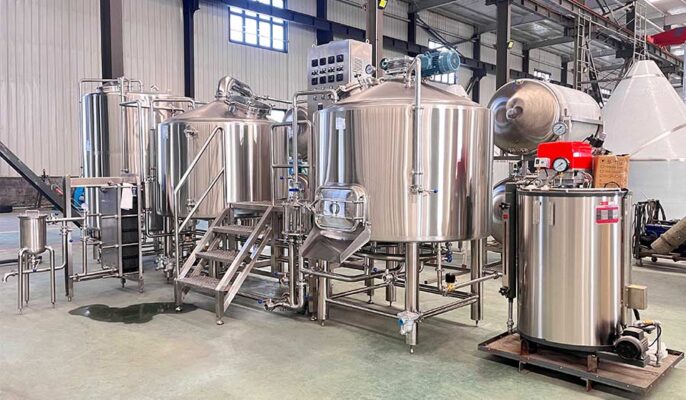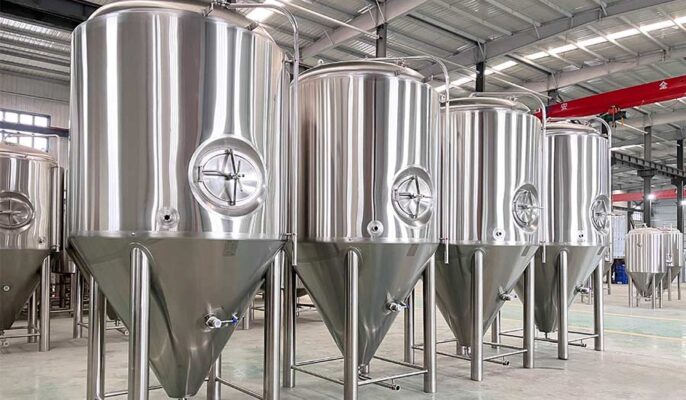Automatische Brausysteme have become popular among commercial and home brewers as demand has grown. In the brewing industry, operating is the key to success. Automation can be the path to achieving your goals because it can improve your brewery operations. This is where automated brewing systems come into play. These innovative systems help breweries produce high-quality beer at scale while saving time, and resources and ensuring a consistent brewing process.
What is an Automated brewing system?
An automatic brewing system is an all-in-one device that simplifies the beer brewing process. These systems combine the functions of many traditional brewing vessels into a single unit, often made from durable and easy-to-clean stainless steel. Automated brewing systems can help brewers save time and money while ensuring the consistent quality of their products.
Automatic brewing systems save a lot of labor in the brewing process. They can perform many tasks such as mashing, boiling, fermenting, and conditioning beer without any human intervention.
The basic components of an automated brewing system:
- Controller: Das Gehirn des Systems, das für die Ausführung bestimmter Brühaufgaben programmiert werden kann.
- Heizelement: Sorgt dafür, dass Wasser oder Bier die richtige Temperatur erreichen.
- Pumpe: befördert Flüssigkeit von einem Behälter in einen anderen.
- Sensors: Watch various parameters such as temperature, pressure, and pH.
- Containers: Containers such as kettles, mash barrels, and fermentation tanks.

Features of automatic brewing systems
- Automated control: The core of the automated brewing system is its digital control panel. This interface allows you to program and check the entire brewing process, including steeping grains (mashing), boiling wort, and controlling fermentation temperature. Some systems even offer smartphone connectivity, allowing you to control and watch your brew .
- Integrated heating element: The automatic brewing system eliminates the need for a separate kettle and heat source. They feature built-in heating elements that raise the water to the precise temperature required for each brewing stage.
- Pumps and filtration: Many systems are equipped with pumps to circulate the wort during the mashing process and transfer between stages. Additionally, some systems include built-in filters to separate the wort from the spent grains after mashing.
- Cleaning System: The automatic cleaning cycle is a popular feature on many systems, simplifying the often daunting post-brew cleaning process.
How can automatisierte Brühsysteme simplify the brewing process?
Recipe accuracy
Automation brings a level of precision to the brewing process, ensuring consistency from batch to batch. From malt grinding to hop addition, automated systems follow recipes to the letter, reducing human error and increasing the ability to replicate desired flavor profiles.
Improved brew control
Automation provides brewers with precise control over key brewing parameters. Temperature, pressure, and flow rate can be adjusted for more predictable and repeatable results. This level of control is particularly beneficial during the mashing, filtering, and boiling processes, where slight deviations can affect the final product.
Strengthen fermentation monitoring
Fermentation is a collision between yeast and wort, and maintaining optimal conditions is crucial. Automated fermentation monitoring systems allow breweries to track temperature, gravity, and other parameters. This real-time data enables brewers to make informed decisions to produce high-quality beer.
Präzise Temperaturregelung
Temperature plays a vital role in the brewing process. The automated system is equipped with sensors that watch and regulate temperatures to maintain an optimal environment for fermentation and other brewing stages.
Improve production capacity
One of the main benefits of automated brewing systems is increased production capacity. These systems are designed to handle large volumes of beer, allowing breweries to meet growing customer demand. With automated brewing systems, breweries can scale up production without sacrificing quality or efficiency.
The brewing process in an automated system is often automated, which allows for more efficient use of time and increases throughput. These systems often include features such as temperature control, automatic ingredient addition, and monitoring capabilities. By automating every aspect of the brewing process, breweries can increase production capacity while maintaining consistency and quality.
Improve cleaning and hygiene efficiency
Maintaining a clean and sanitary brewing environment is critical to producing contamination-free, odor-free beer. Automated clean-in-place (CIP) systems streamline the process and reduce downtime between batches. Brewers can divide more time to brewing, spend less time cleaning , and increase production efficiency.
Sicherung der Qualität
Ensure quality and reduce errors. As automated systems control key aspects of the brewing process such as temperature and time, parameters such as temperature, pH, and pressure are measured. Breweries can track these measurements in real-time and make adjustments as needed to ensure the beer is brewed to the desired specifications. This minimizes the chance of errors that could lead to batch damage.

Application of automated brewing system
- Home Brewing: Automated brewing systems have revolutionized the home brewing industry. These systems are compact, easy to use, and designed to fit into a home environment. Avid enthusiasts can now brew their unique beers with ease.
- Microbrewery: Focuses on producing small quantities of beer, often focusing on quality, flavor, and unique recipes. Automated brewing systems allow these breweries to maintain batch-to-batch consistency, ensuring loyal customers always get the beer they love.
- Restaurants and Bars: Some restaurants and bars have adopted in-house brewing to offer customers fresh and unique beer varieties. Automated systems make this possible without requiring extensive brewing expertise on-site.
Choosing the right automated brewing system
Several factors should be considered when choosing an automated brewing system:
- Budget: Automatic brewing systems can range in price from a few hundred dollars to a few thousand dollars. Consider how much you are willing to invest and choose a system that provides the features you need within your budget.
- Experience Level: If you are new to home brewing, an extract brewing system may be a good place to start because of its ease of use. As you gain experience, you can upgrade to more complex whole-grain systems.
- Batch size: Consider how much beer is brewed per batch. Automated systems come in different capacities, so choose one that meets your brewing needs.
- Features: Determine which features are most important to you. Do you need smartphone connectivity? Integrated cleaning system? Focus on features that enhance your brewing experience.
Automated brewing systems have revolutionized the brewing industry by streamlining the brewing process and allowing breweries to produce beer at scale without compromising quality and consistency. These systems offer benefits such as increased production capacity, improved efficiency, improved consistency, quality control and monitoring, and simplified cleaning and maintenance. Micet has extensive experience in automated brewing system equipment and can customize your automated brewing equipment according to customer needs and preferences.




